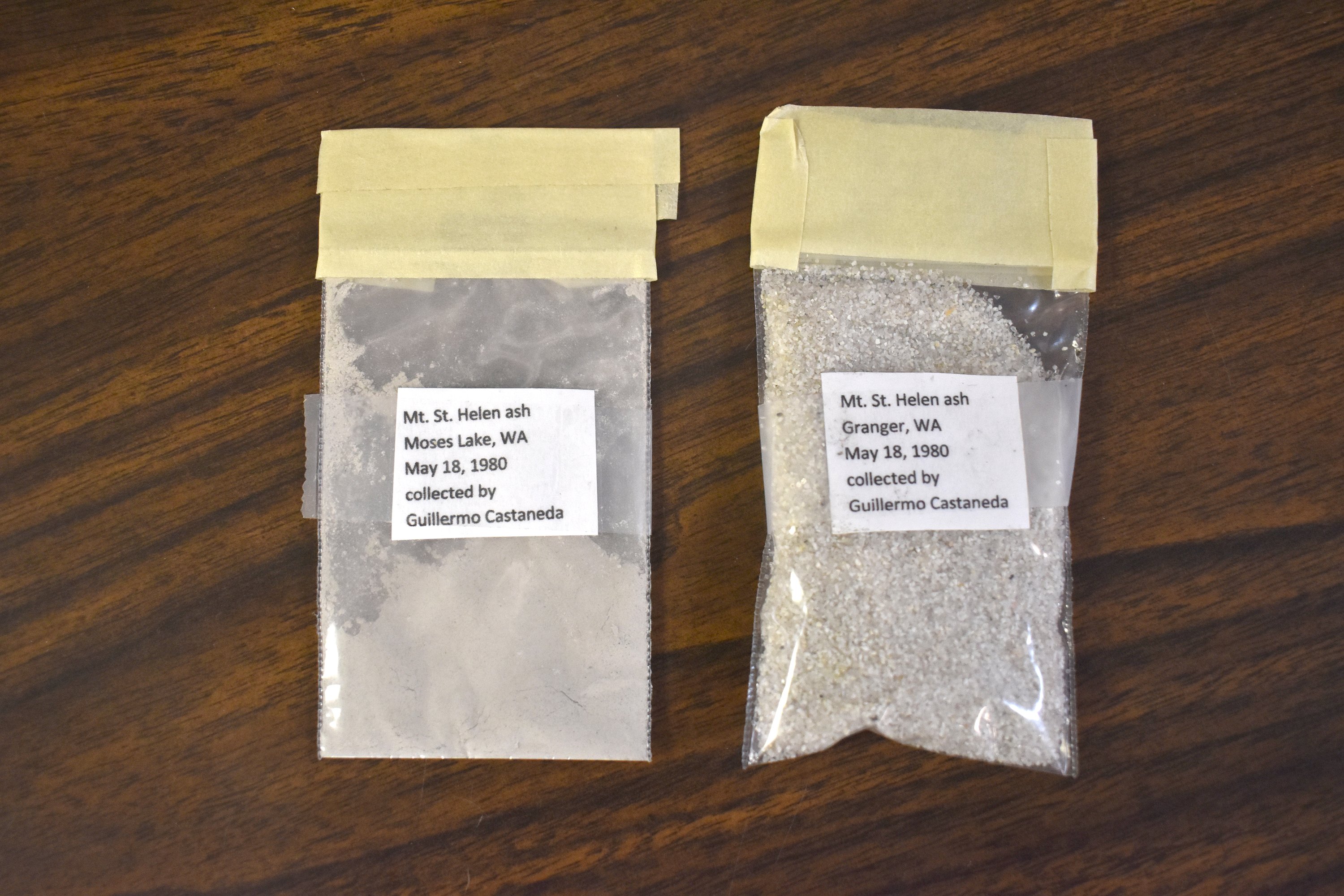A memory of the Mount St. Helens eruption 44 years later
Guillermo V. Castaneda of Granger sent this poem to the Columbia Basin Herald in commemoration of the eruption of Mount St. Helens, which took place 34 years ago Saturday. At the time of the eruption, Castaneda was the director of the Migrant Health Clinic in Wenatchee and was in the process of setting up a community medical and dental clinic for migrants in Moses Lake, he wrote.
“I composed my poem all while the mountain was exploding,” Castaneda wrote to the Columbia Basin Herald. “I was checking my pig pen at 9 a.m. in Granger, but the mountain had already exploded at 8:39 a.m. I took special precaution to note the precise clock times of the developing occurrences through the day.”
The ash from the eruption of Mount St. Helens covered the Columbia Basin and left many motorists stranded on I-90. The following day, a Monday, continues to be the only regular publication day since its founding in 1941 that the Columbia Basin Herald did not publish a newspaper.
Castaneda’s poem is presented here with only minimal editing.
The Day Saint Helens Mountain Blew Her Head
May 18, 1980
By Guillermo William V. Castaneda
A Sunday morning, nine a.m.,
As I was checking on my pen
For holes or places soft to dig
(Escape routes for a wiener pig,)
I heard a constant, rumble roar,
A sound I've never heard before.
My friend, you see, I'll call him Ray,
Had promised me a swine that day,
So that's why I was checking up
With eye and tug and coffee cup.
How odd, I thought, there is no end
To that big roar ... no lightening friend.
My mind now suddenly changed tracks
From dreaming hams to getting back
To real-life thoughts of wondering
What acts to Earth that sound would bring.
How strange, that roar! I wonder why
So rapidly a darkening sky?
As I approached the kitchen door
I told my wife about the roar.
"I know," she winced. "I heard it, too."
And I replied: "I think She blew!"
Eight-thirty-nine, the radio said,
Saint Helens Mountain blew her head!
"My pad," I bade, elatedly,
To scribble down this history!
|My observations to inform
My descendants (those yet not born.)
'Our forefather,' they'll proudly show,
'Survived the greatest volcano!’
"Nineteen-eighty," I had begun,
"On May eighteen in Washington,
In Yakima, my county place,
My people one and every race."
Forty past ten, my wristwatch had,
Whence came a scratch noise from my pad.
Ingenious words, I thought, with rhyme,
Important writings, and with chime.
How dare, then, scratching interfere
With my great work of this great Year?
"Get off my page, impertinent sand;
I'll soon remove you with my hand!"
The granules flew but many more
Returned to even up the score.
"Why do you haunt me? To abash?"
And then a vision: It was ash!
For we were warned that if She yelled
Great tons of ash would be expelled.
"Inside the house!" I quickly cried.
My family, six, was soon inside.
We closed the doors, the windows, too;
We knew not, then, what else to do.
Oh, I had sailed on many a sea
But eruptions were new to me.
The silent, pepper ashes came
Like grayish mist and powder rain.
They smothered all and everything,
This strange material, bizarre thing!
Then, as I wrote and had my fun
It brashly blotted out the Sun!
So darkened was that night at day,
It made the Total Eclipse, play.
It made in me a fright begin,
This morning-night, eleven-ten.
What great disasters follow next?
Is this "The End"? And: Are we hexed?
My worries and my mild distress,
My sudden state of helplessness
Began to dwindle, tooth-by-tusk
As blind Fate transformed dark-to-dusk.
Sweet light appeared now, gradually.
"Hooray! Thank God! Normality!"
Such jubilation, soon beguiled,
(Like stealing candy from a child,)
For what I saw, I sadly say,
My favorite season turned to gray!
Lush Valley, hours before so green,
Now gray and dusty, so obscene!
An hour of mid-night, at mid-day
Begat a world of smoky-gray,
A Death-like scene, so crude, unjust,
Ashes-to-Ashes, Dust-to-Dust!
I curse those sounds of constant roar.
I scorn the Ash-to Earth they bore.
Week-in, week-out, officials say,
Or months to clear the ash away,
Or years before the experts know
The dollar-damage of the blow.
A measure of Saint Helen's wrath;
A yardstick of her deadly path.
My tale is o'er now, I must go
To ponder on this grayish snow.
But ere I leave I offer thee
This plain, my simple history.
Oh yes! My pig I'll get, it seems,
And so continue in my dreams.
 Guillermo V. Castaneda sent the Columbia Basin Herald these two samples of ash from the eruption of Mount St. Helens on May 18, 1980. The ash that landed in Granger, only about 60 miles away, is considerably coarser than that which inundated Moses Lake the same day. Castaneda wrote that he calculated the ash’s speed between the mountain and Granger at 45.2 miles per hour.
Guillermo V. Castaneda sent the Columbia Basin Herald these two samples of ash from the eruption of Mount St. Helens on May 18, 1980. The ash that landed in Granger, only about 60 miles away, is considerably coarser than that which inundated Moses Lake the same day. Castaneda wrote that he calculated the ash’s speed between the mountain and Granger at 45.2 miles per hour.

